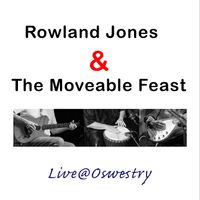-
How it is 3:510:00/3:51
Reviews
 www.bluesblastmagazine.com
www.bluesblastmagazine.com
Rowland Jones keeps things live and acoustic on Live@Oswestry, an album of jazzy blues and bluesy rock made with his band, The Moveable Feast.
Jones says folk rock legend Richie Havens influenced him, and that impact shows on Live@Oswestry. Jones’ guitar drives the songs, serving as both guitar and drums. That frees up his rhythm section to provide color and texture, reinforcing the groove but also able to do other things, which results in a surprisingly full sound.
“Always Thought” is a low-key ballad, Jones providing the melody and the beat, with the rhythm section laying down a subtle counterpoint. Jones has a nice voice comprised of hints of jazzy intricacy and straight-ahead rock power. His vocals would work well in many musical contexts, but here, singing over a sketch of a tune, he’s able to take advantage of the leftover sonic space. Percussionist Iain Mellor works in the background, and bassist Bo Lee does an impressive job pulling the song along.
“A Million Ways” is jazzy, with a Spanish vibe. It’s a mellow tune, even with its lengthy percussive interlude from Mellor. “Never Met Someone” is similarly jazzy and laid back, but for this tune Jones transitions into an electric sound, giving the album an energy jolt.
The best way to understand the album is by checking out “Never Been to Memphis,” a funky blues rock tune, where Jones sings, “No, I ain’t no Delta bluesman / Can’t tell a nickel from a dime” before eventually turning to the line “Blues feels like home for me.” Jones is playing acoustic music and he’s influenced by the blues, and by artists, like Havens, who drew from the blues, but Jones isn’t a pure blues artist. But there are blues flourishes within the album.
The joy of acoustic albums is they make it easy to hear the essence of a song. The challenge of acoustic albums is that they can get repetitive because of the limited musical palette. Jones does a nice job mixing up his song styles so that the album moves, although with three tracks coming in at over five minutes, there might have been some room to further prune some tracks. But his performances, coupled with a backing band that understands how to flesh out Jones’ songs, while also staying out of his way, makes for a relaxed listening experience, like an afternoon at a coffee shop with a tight, talented band playing in the background.


'His music is .. blues influenced Americana with, I would add, a fair smattering of Jazz and straight forward singer-songwriter fare. On an enjoyable album, stand out tracks for me are the chunky backbeat driven 'Don't Play With Fire', supple guitar stylings of 'Where's The Why?' and the ruefully tongue in cheek name dropping 'Never Been To Memphis'. FATEA magazine (UK)
'An album that will immediately and easily appeal to lovers of genuinely good quality modern Blues’
Blues Town Music (Netherlands)
An album well worth discovering, performed by an experienced blues man, who knows exactly what to do with this music'
Blues Matters (UK)
'Sometimes simple things are best - the more you simplify, the more precise you have to be. Take acoustic solo blues. It’s a whole different animal from band-based electric blues. With the latter, the instrumentation is the focal point rather than vocals and lyrics. When all you have to rely on are your acoustic guitar and your voice, no such backup exists. There’s no safety net. You’re walking a tightrope of timbre and tone: an exacting balancing act.
Rowland Jones performs it on his latest Live album, featuring eleven original songs with sophisticated, spot-on lyrics (“Still the Blues,” “Squeeze Me Right,” “How It Is”) and sophistication born of a decades-long and unwavering love affair with blues music.
Imagine this CD not as a sell-out concert meant to inspire hundreds to play their own blues, but an intimate conversation between Jones and his listeners. He means to reach you and teach you what the blues is about, not just grandstand for the benefit of social and other media. Acoustic solo blues puts one on a high wire, and Rowland, for the most part, keeps his equilibrium.
www.BluesBlastMagazine.com (US)
